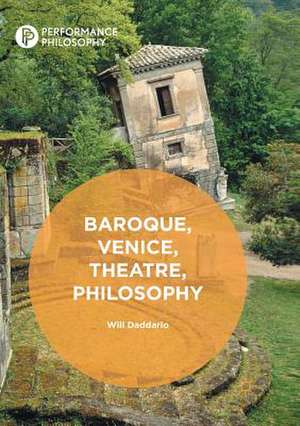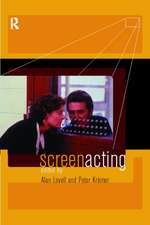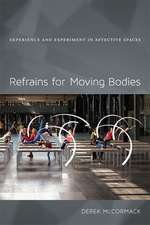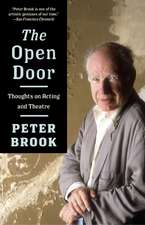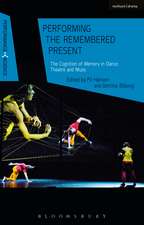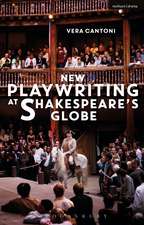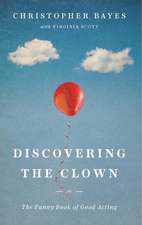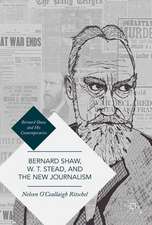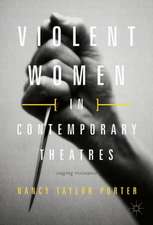Baroque, Venice, Theatre, Philosophy: Performance Philosophy
Autor Will Daddarioen Limba Engleză Paperback – aug 2018
| Toate formatele și edițiile | Preț | Express |
|---|---|---|
| Paperback (1) | 637.13 lei 6-8 săpt. | |
| Springer International Publishing – aug 2018 | 637.13 lei 6-8 săpt. | |
| Hardback (1) | 642.51 lei 6-8 săpt. | |
| Springer International Publishing – 14 iun 2017 | 642.51 lei 6-8 săpt. |
Din seria Performance Philosophy
- 18%
 Preț: 781.00 lei
Preț: 781.00 lei - 9%
 Preț: 627.39 lei
Preț: 627.39 lei -
 Preț: 392.60 lei
Preț: 392.60 lei -
 Preț: 390.63 lei
Preț: 390.63 lei - 15%
 Preț: 580.68 lei
Preț: 580.68 lei - 15%
 Preț: 644.30 lei
Preț: 644.30 lei - 9%
 Preț: 743.14 lei
Preț: 743.14 lei -
 Preț: 219.52 lei
Preț: 219.52 lei - 18%
 Preț: 895.27 lei
Preț: 895.27 lei - 15%
 Preț: 642.51 lei
Preț: 642.51 lei - 15%
 Preț: 702.87 lei
Preț: 702.87 lei - 18%
 Preț: 730.02 lei
Preț: 730.02 lei - 15%
 Preț: 528.63 lei
Preț: 528.63 lei -
 Preț: 228.95 lei
Preț: 228.95 lei - 18%
 Preț: 895.76 lei
Preț: 895.76 lei - 15%
 Preț: 500.42 lei
Preț: 500.42 lei -
 Preț: 385.47 lei
Preț: 385.47 lei - 15%
 Preț: 523.22 lei
Preț: 523.22 lei - 18%
 Preț: 779.71 lei
Preț: 779.71 lei - 15%
 Preț: 523.91 lei
Preț: 523.91 lei -
 Preț: 452.62 lei
Preț: 452.62 lei - 23%
 Preț: 589.97 lei
Preț: 589.97 lei - 18%
 Preț: 782.42 lei
Preț: 782.42 lei - 27%
 Preț: 710.31 lei
Preț: 710.31 lei - 27%
 Preț: 672.89 lei
Preț: 672.89 lei - 32%
 Preț: 526.54 lei
Preț: 526.54 lei
Preț: 637.13 lei
Preț vechi: 749.56 lei
-15% Nou
Puncte Express: 956
Preț estimativ în valută:
121.93€ • 132.40$ • 102.42£
121.93€ • 132.40$ • 102.42£
Carte tipărită la comandă
Livrare economică 22 aprilie-06 mai
Preluare comenzi: 021 569.72.76
Specificații
ISBN-13: 9783319841793
ISBN-10: 3319841793
Pagini: 261
Ilustrații: IX, 261 p.
Dimensiuni: 148 x 210 mm
Greutate: 0.33 kg
Ediția:Softcover reprint of the original 1st ed. 2017
Editura: Springer International Publishing
Colecția Palgrave Macmillan
Seria Performance Philosophy
Locul publicării:Cham, Switzerland
ISBN-10: 3319841793
Pagini: 261
Ilustrații: IX, 261 p.
Dimensiuni: 148 x 210 mm
Greutate: 0.33 kg
Ediția:Softcover reprint of the original 1st ed. 2017
Editura: Springer International Publishing
Colecția Palgrave Macmillan
Seria Performance Philosophy
Locul publicării:Cham, Switzerland
Cuprins
Introduction.- Part I. Baroque Pastoral.- Chapter 1. Garden Thinking and Baroque Pastoral.- Chapter 2. Pastoral Askew and Aslant.- Chapter 3. Jesuit Pastoral Theatre.- Part II. Discipline and Excess.- Chapter 4. Ruzzante Takes Place.- Chapter 5. The Enscenement of Self and the Jesuit 'Teatro del Mondo'.- Chapter 6. Baroque Diarchic Self.- Bibliography.- Index.
Recenzii
“Baroque, Venice, Theatre, Philosophy is a clearly written, closely argued, and carefully drawn study of the Italian baroque in historical (sixteenth and seventeenth centuries), architectural, and metaphorical space and time.” (Spencer Golub,Theatre Journal, Vol. 71 (4), December, 2019)
“A worthy addition to the Jesuit theater bookshelf.” (Kevin J. Wetmore, Journal of Jesuit Studies, Vol. 5, 2018)
Notă biografică
Will Daddario is Co-Editor with Karoline Gritzner of Adorno and Performance (2014) and with Laura Cull Ó Maoilearca of Manifesto Now! Instructions for Performance, Philosophy, Politics (2013). He is the Chair of the Performance and Philosophy Working Group within Performance Studies international and a founding member of the international network Performance Philosophy.
Textul de pe ultima copertă
This book theorizes the baroque as neither a time period nor an artistic style but as a collection of bodily practices developed from clashes between governmental discipline and artistic excess, moving between the dramaturgy of Jesuit spiritual exercises, the political theatre-making of Angelo Beolco (aka Ruzzante), and the civic governance of the Venetian Republic at a time of great tumult. The manuscript assembles plays seldom read or viewed by English-speaking audiences, archival materials from three Venetian archives, and several secondary sources on baroque, Renaissance, and early modern epistemology in order to forward and argument for understanding the baroque as a gathering of social practices. Such a rethinking of the baroque aims to complement the already lively studies of neo-baroque aesthetics and ethics emerging in contemporary scholarship on (for example) Latin American political art.
Caracteristici
Provides a simultaneously detailed and accessible analysis of Baroque aesthetics Takes a multidisciplinary approach to this under-explored subject, opening up the topic's analysis and interpretation to a wider audience Investigates the intersection of contemporary and medieval philosophy in its exploration of Italian Baroque culture
